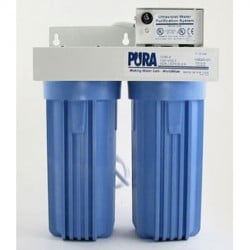 Ah, summertime! Lush, green grass; warm temperatures and … boil-water advisories. If you are in an area served by a municipal water system, you've probably resigned yourself to this warm-weather nuisance. Boiling water for one to three minutes before drinking (or cooking with) is standard procedure to get rid of the contaminants that will make you sick. Did you know, however, that there is a way to avoid this aggravation completely and still be safe?
Ah, summertime! Lush, green grass; warm temperatures and … boil-water advisories. If you are in an area served by a municipal water system, you've probably resigned yourself to this warm-weather nuisance. Boiling water for one to three minutes before drinking (or cooking with) is standard procedure to get rid of the contaminants that will make you sick. Did you know, however, that there is a way to avoid this aggravation completely and still be safe?
When Do Boil-Water Advisories Happen?
According to Wikipedia, boil-water alerts are put into effect when, "monitoring of water being served to consumers detects E. coli or other microbiological indicators of sewage contamination. Another reason for a BWA is a failure of distribution system integrity evidenced by a loss of system pressure. While loss of pressure does not necessarily mean the water has been contaminated, it does mean that pathogens may be able to enter the piped-water system and thus be carried to consumers."
If you drink contaminated water, you may experience any number of symptoms, including:
- diarrhea
- nausea
- cramps
- headaches
- fatigue
- jaundice
and, in extreme cases,
- loss of consciousness
- death
If you're in the United States, you can get information about local water safety from the EPA's website.
While boil-water advisories are typically used for city water systems, people and businesses that drink well water are not exempt from contaminants. In fact, they may be more susceptible because they don't receive boil-water alerts.
Wells Are Not Immune from Problems
The Environmental Protection Agency issues this warning on their website with regard to well water: "Unlike public drinking water systems serving many people, they do not have experts regularly checking the water’s source and its quality before it is sent to the tap. These households must take special precautions to ensure the protection and maintenance of their drinking water supplies."
The solution to the problem - whether city water or well… whether residential or commercial - is to use an ultra-violet water filtration system.
As you might guess, there are several different types of water filtration systems available for different settings and needs. However, it takes the special properties of an ultra-violet system to effectively combat contaminated water.
Unlike countertop and reverse osmosis (RO) water systems, ultra-violet isn't a filter: it's a system for destroying microorganisms right down to their DNA and sterilizing water.
As mentioned on our site, "Waterborne bacteria is a problem that continues to make headlines throughout the world. From Cryptosporidium outbreaks in Wisconsin, California and New York, to threats of E-coli, Salmonella, Giardia and other life-threatening parasites, we are forced to protect ourselves from these biological intruders. Although most municipal water treatment facilities use chlorine to destroy most waterborne bacteria, chlorine does not destroy harmful parasitic microorganisms such as crypto and giardia."
Ultra-violet (UV) water sterilization is especially good for homeowners using well water or for those who live in areas with frequent boil-water alerts. The Environmental Protection Agency (EPA) even advocates the use of UV treatment for the sterilization of wastewater.
What's so Special About UV?
In addition to killing bacteria and other contaminants in our water, UV rays actually disrupt the living cells of those microorganisms, leaving them unable to function. When this breakdown of their DNA occurs, they die and are then removed from your water.
This is the same type of system chosen by professionals for not only water treatment, but also medical sanitation. However, UV alone isn't the answer.
Double-Duty UV Water Filters
According to a Wikipedia article, "Suspended particles are a problem because microorganisms buried within particles are shielded from the UV light and pass through the unit unaffected." That's why your ultra-violet system needs to also include carbon-block filtration. The article continues, "UV systems can be coupled with a pre-filter to remove those larger organisms that would otherwise pass through the UV system unaffected." These types of UV water systems are available on our site.
Whether your goal is to avoid annoying boil-water advisories or simply to have better quality water to drink, ultra-violet filtration systems are an economical option that saves money long term. Look for under-the-counter, countertop and bottleless water coolers with UV.
Deciding which one is right for your home or business can be a bit confusing. If you need help with making the right choice, please contact us toll-free at 800-237-9199. By asking you a few simple questions, we can quickly determine which system is best for your situation.



.jpg)

